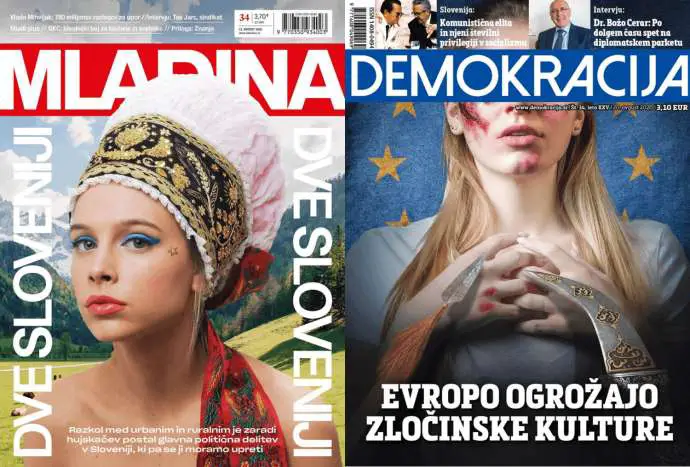The covers and editorials from leading weeklies of the Left and Right for the work-week ending Friday, 21 August 2020. All our stories about coronavirus and Slovenia are here
Mladina: Lack of info makes it hard to see through govt measures
STA, 21 August 2020 - A poor flow of information stemming from the coronavirus pandemic makes it harder to compare Slovenian government decisions to developments in other countries, the left-wing Mladina weekly says in Friday's editorial, headlined Closed Society. It criticises a decision to introduce quarantine for returns from Croatia instead of offering testing.
Editor-in-chief Grega Repovž says that we are witnessing a year when information flow has drastically slowed down globally, with the focus on Covid-related information.
The lack of information makes comparison with other countries harder, so Slovenians see government decisions as "completely logical and the only possibly ones".
Repovž points to a decision to impose a two-week quarantine for travellers returning from Croatia, saying public debate is centred on whether to introduce it or not, instead of considering a third option - mandatory testing.
While this option has been introduced in the majority of Western countries, there is no public pressure to consider it in Slovenia and the government is not mentioning it.
If one decides on voluntary testing, they can do it at only two points, and it comes with a high price tag of over 90 euro.
Belgium, a much richer country, offers it for a mere 46 euro, and it is free of charge in Austria or Germany for those returning from other countries.
Repovž says that many people being quarantined has economic consequences for entire Slovenia which go beyond the potential cost of testing for the state.
But being closed information-wise, we see the government's thoughtless moves as the only option, he says.
Education is another area the editor takes issue with, saying the government should have changed legislation to give schools more autonomy in adjusting to Covid-19.
Instead, headmasters and teachers are terrified not knowing whether they will be able to observe all the recommendations.
Repovž says that if there was no emergency due to the epidemic, all major world media outlets would have sent their teams to Slovenia by now.
The epidemic has somewhat concealed the fact that Slovenia is an EU member state where anti-establishment protests have been going on for the fifth month running.
Was there no epidemic, it would be clearer the country is in a deep political crisis, says Repovž, adding that foreign media will probably realise that in the autumn when protests get more radical.
Problematic East European countries linking up in an ever louder and self-confident manner gives the EU and its powerful members more opportunities to react in a harder and clearer manner to the course pursued by the European East, to which Slovenia now belongs, concludes the editorial.
Demokracija: Remote learning prevents left-wing indoctrination
STA, 20 August 2020 - Two weeks before students are to return to brick-and-mortar schools, the right-wing weekly Demokracija says there would be no harm for students if remote learning continues in the autumn, saying that left-wing politicians are critical of this scenario because it would make it harder for them to indoctrinate children.
The weekly says that the results of the matura secondary school leaving exam were better this year following months of remote learning, but the left wing leaves this out of debates. Instead, they focus on "socialisation, which is actually indoctrination and has been made harder in distant learning."
"They are scared that they are losing power over the young and over their training to become future obedient multiculturalists and rainbow warriors," Demokracija editor-in-chief Jože Biščak says under the headline Dialectics of Good and Bad.
When a child learns by themselves or with the help of parents, focus shits away from things deemed important in the 2011 education white paper put together by a left government.
The biggest victory of cultural Marxists was to change education white books so as to render knowledge unimportant. Standards have been lowered to accommodate the "new citizens, arrivals from countries where the average IQ is by up to two standard deviation classes lower than the average IQ in developed countries".
The goal was social engineering that made subjects like the mother tongue, mathematics, physics and other natural sciences unimportant, replacing them with environmental activism, hunger and poverty, LGBT rights, multiculturalism, the fault of Europeans for the underdeveloped third world, green energy and social fairness.
The consequence is that children are raised to be mediocre to reduce the differences between them. "This is a typical socialist concept of being equal in poverty, but with an enlightened (and self-proclaimed) elite at the head".
The elite is the only one to benefit from the system that makes the development of any country virtually impossible by repressing meritocracy, whereas the latter benefits everybody, even those who are unsuccessful. The meritocratic elite can split an atom, research nanoparticles, send a man to the moon, make iPhones and laptops and boost food production with sophisticated technology.
To raise as many such people as possible, the education system should only provide young people with knowledge, they can form their own view of the world later on by themselves. This is the only way we can move forward, Demokracija says.
"You don't believe me? I ask you, which of these studies is more important to tackle hunger and poverty: studies by various 'peace institutes' about patriarchy in rural areas and gender equality in agricultural work, or a study by a technical institute about new and more effective ways to grow corn and cereal?"
All our posts in this series are here







